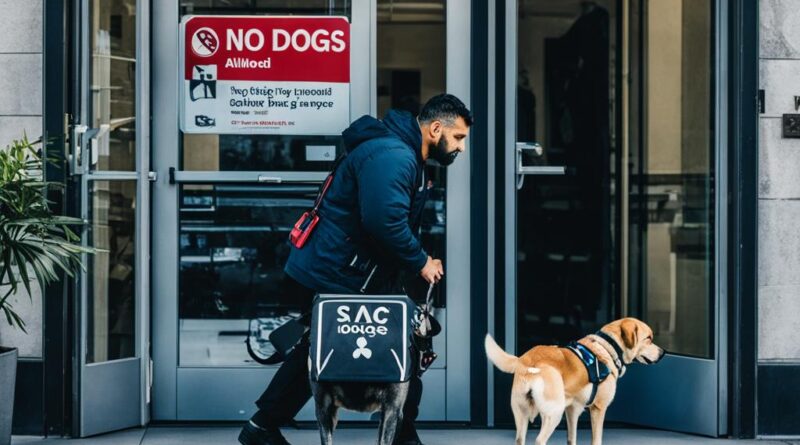Can Landlords Legally Refuse a Service Dog?
When it comes to service animals, such as service dogs, the rights of individuals with disabilities are protected by law. The Americans with Disabilities Act (ADA) defines a service animal as any dog that is individually trained to perform tasks or work for the benefit of a person with a disability. These tasks can range from assisting with navigation to alerting to sounds or allergens, among others.
But what happens when a tenant with a disability needs a service dog, and the landlord has a “no pet” policy? Can landlords legally refuse a service dog? Let’s take a closer look at the rights of both landlords and tenants in these situations.
Key Takeaways:
- Under the Americans with Disabilities Act (ADA), service animals are not considered pets and must be allowed in rental units, even if there is a “no pet” policy.
- Public accommodations, such as restaurants, hotels, and retail stores, are also required to allow service animals.
- Landlords cannot ask about the nature or extent of a person’s disability but can inquire about the tasks the service animal has been trained to perform.
- Landlords must make reasonable accommodations for tenants with disabilities who require service animals.
- If a service animal is causing disturbances or significant property damage, landlords have the right to take appropriate action.
Service Animals in Public Accommodations
Public facilities, such as restaurants, hotels, retail stores, theaters, and sports facilities, must allow service animals. The service animals are allowed in all areas of the facility where the public is allowed.
Landlords cannot impose extra deposits, fees, or surcharges for service animals, but they can charge a fee if the service animal causes damage.
The Fair Housing Act also protects the right of individuals with disabilities to have service animals in housing, regardless of a “no pets” policy.
Here is a table summarizing the rights and responsibilities of landlords regarding service animals:
| Landlord’s Rights | Landlord’s Responsibilities |
|---|---|
| Require verification of the tenant’s disability | Make reasonable accommodations for tenants with disabilities who require service animals |
| Request copies of the animal’s health records | Cannot deny a tenant’s request for a service animal |
| Write warnings or evict tenants if the service animal causes disturbances, poses a threat, or causes significant property damage |
Documentation and Requirements for Service Animals
When it comes to service animals, landlords have certain rights and responsibilities. While they cannot ask about the nature or extent of a person’s disability, they can inquire about the necessity of the service animal. If it is not readily apparent that a dog is a service animal, landlords may ask if the animal is required because of a disability and what tasks it has been trained to perform.
Certification is not required for a public accommodation, despite some businesses selling fake service dog certifications. However, landlords can request documentation of the tenant’s disability and their need for a service animal. This documentation can help ensure that the landlord is properly accommodating the tenant’s needs while also protecting the rights of other tenants.
It is important for landlords to understand and follow the service animal requirements and laws. This will help create a respectful and inclusive environment for all tenants.
Service Animal Documentation Checklist:
| Document | Description |
|---|---|
| 1. Letter from Healthcare or Rehabilitation Professional | A letter specifying the tenant’s disability and their need for a service animal. |
| 2. Service Animal Training Documentation | Documentation outlining the tasks the service animal has been trained to perform. |
| 3. Vaccination Records | Proof of the service animal’s vaccinations to ensure it poses no health risk to other tenants. |
| 4. Information on Emergency Contact | Details of an emergency contact person who can care for the service animal if needed. |
By requesting and reviewing the appropriate documentation, landlords can ensure the legitimacy of the tenant’s request for a service animal while also respecting their rights under the law.

Landlord’s Rights and Responsibilities
As a landlord, it’s important to understand your rights and responsibilities when it comes to service animals. While you cannot deny a tenant’s request for a service animal, even if you have a “no pet” policy in place, there are certain actions you can take to ensure the well-being of your property and other tenants.
Verification and Documentation
When a tenant requests to have a service animal, you have the right to ask for verification of their disability and their need for the service animal. This could be in the form of a letter from a healthcare professional or other documentation that confirms the tenant’s disability and the necessity of the service animal. It’s important to respect the tenant’s privacy and not ask for details about their disability.
You can also request copies of the service animal’s health records to ensure that it is up to date on vaccinations and in good health. This helps protect the health and safety of other tenants and your property as well.
Addressing Concerns
In some cases, a service animal may cause disturbances or pose a threat to other tenants or property. If this occurs, it’s within your rights as a landlord to address the situation. Start by discussing the issue with the tenant and expressing your concerns. Together, you can explore potential solutions to mitigate any disturbances or threats.
If the situation cannot be resolved, you may need to issue warnings or even consider eviction. However, it’s crucial to follow the proper legal procedures and consult with legal professionals to ensure that you are acting within the law and not discriminating against the tenant with a disability.
Creating a Welcoming Environment
While it’s essential to protect your property and other tenants, it’s equally important to create a welcoming and inclusive environment for tenants with disabilities and their service animals. By making reasonable accommodations and treating all tenants with respect and dignity, you can foster a positive living experience for everyone.
Conclusion
Landlords must understand and abide by the service animal rights for tenants as outlined in the Fair Housing Act and the Americans with Disabilities Act. These laws protect individuals with disabilities and their right to have service animals in both public accommodations and housing.
Service animals are not considered pets and should not be subject to “no pet” policies. Landlords have a legal obligation to make reasonable accommodations for tenants with disabilities who require service animals. This includes allowing them to reside in rental units and public facilities, even if there are existing policies prohibiting pets.
While landlords cannot demand certification for service animals, they may request documentation of the tenant’s disability and the need for a service animal. It is crucial for landlords to approach these situations with sensitivity and respect, ensuring equal access for tenants with disabilities.
By understanding and adhering to the laws governing service animals, landlords can create inclusive and accommodating environments that promote the well-being and independence of individuals with disabilities.
FAQ
Can a landlord refuse a service dog?
No, landlords cannot legally refuse a service dog. Service animals are protected by the Americans with Disabilities Act (ADA) and the Fair Housing Act, which require landlords to make reasonable accommodations for tenants with disabilities who require service animals.
Are landlords allowed to have a “no pet” policy for service animals?
No, landlords cannot enforce a “no pet” policy when it comes to service animals. Service animals are not considered pets and are protected by law. Landlords must make exceptions to their pet policies to accommodate tenants with disabilities who require service animals.
Can a landlord ask for proof of disability for a service animal?
Landlords cannot ask about the nature or extent of a person’s disability, but they can ask if the service animal is required because of a disability and what tasks the animal has been trained to perform. However, landlords can request documentation of the tenant’s disability and their need for the service animal.
Can a landlord charge extra fees for a service animal?
No, landlords cannot impose extra deposits, fees, or surcharges for service animals. However, if the service animal causes damage to the rental unit, landlords can charge a fee to cover the cost of repairs.
What rights do landlords have when it comes to service animals?
Landlords have the right to request documentation of the tenant’s disability and their need for a service animal. They can also request copies of the animal’s health records to ensure it is in good health. If the service animal is causing disturbances, posing a threat to others, or causing significant property damage, landlords have the right to write warnings or even evict the tenant.

